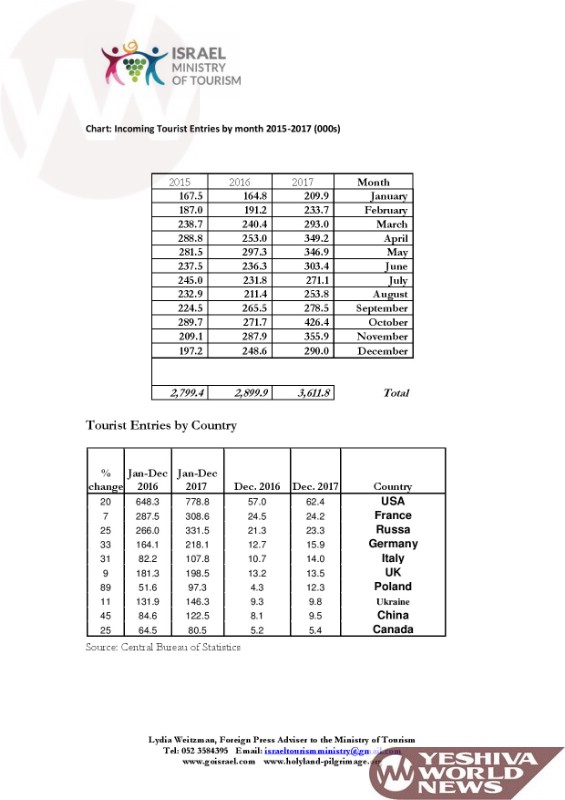According to Israel’s Central Bureau of Statistics, the final tourism statistics for 2017 are as follows: 3,611,800 million tourist entries were recorded, 25% increase on 2016 and 29% on 2015. 290,000 tourist entries were recorded in December 2017, about 17% more than December 2016 and 47% more than December 2015. There were about 308,000 visitor entries in December (including day visitors). (That number increases to 3,861,300 including day visitors)
The United States remains the largest source country for incoming tourists, with 778,800 tourist entries in 2017, 20% more than 2016. The second largest source country is Russia (331,500), France (308,600), Germany (218,100) and the UK (198,500).
The largest increase in incoming tourism in 2017 took place in the two countries where the Tourism Ministry invested considerably in marketing – Poland (89% increase) and China (45%). There was also a 33% increase in tourism from Germany, another country where the ministry has concentrated significant marketing investment.
Tourism Minister Yariv Levin: “The year 2017 was a historic turning point for incoming tourism to Israel. More than 3.6 million tourists arrived here during the year, an increase of 700,000 tourists on last year. This is, of course, an all-time record – we have never before crossed the 3-million-tourist threshold. This is a direct outcome of an all-encompassing revolution in marketing policy that we have implemented over the last two years: principally, adopting an innovative marketing strategy, offering incentives to airlines to open new routes with significant incoming tourism potential and collaborations that have been created for the first time with the largest online travel agents in the world. The revolution in tourism in 2017 has made a huge contribution to Israel’s economy. For the first time, revenue from incoming tourism passed the NIS 20 billion threshold, while creating about 25,000 new jobs.”
Director-General of the Ministry of Tourism, Amir Halevi: “Having broken the all-time record in tourism as a result of innovative and creative marketing activities, we have begun to make changes in the organizational structure of the ministry, with the aim of adapting it to the new tourism market, with an emphasis on the digital space and developing niche tourism markets such as sport, culinary and more. We have also worked to improve the tourism infrastructure, with the guiding principle being first of all the maintenance and cleanliness of existing sites. We are working to diversify the accommodation options in Israel to suit the developing market trends, and thereafter increase incoming tourism. We are also working to recruit manpower for the industry, which currently employs more than 200,000 people. As a result of all these changes, we are optimistic about the growth in tourism and its consolidation as a significant contributory factor to the economy and the job market.”

(YWN – Israel Desk, Jerusalem)











